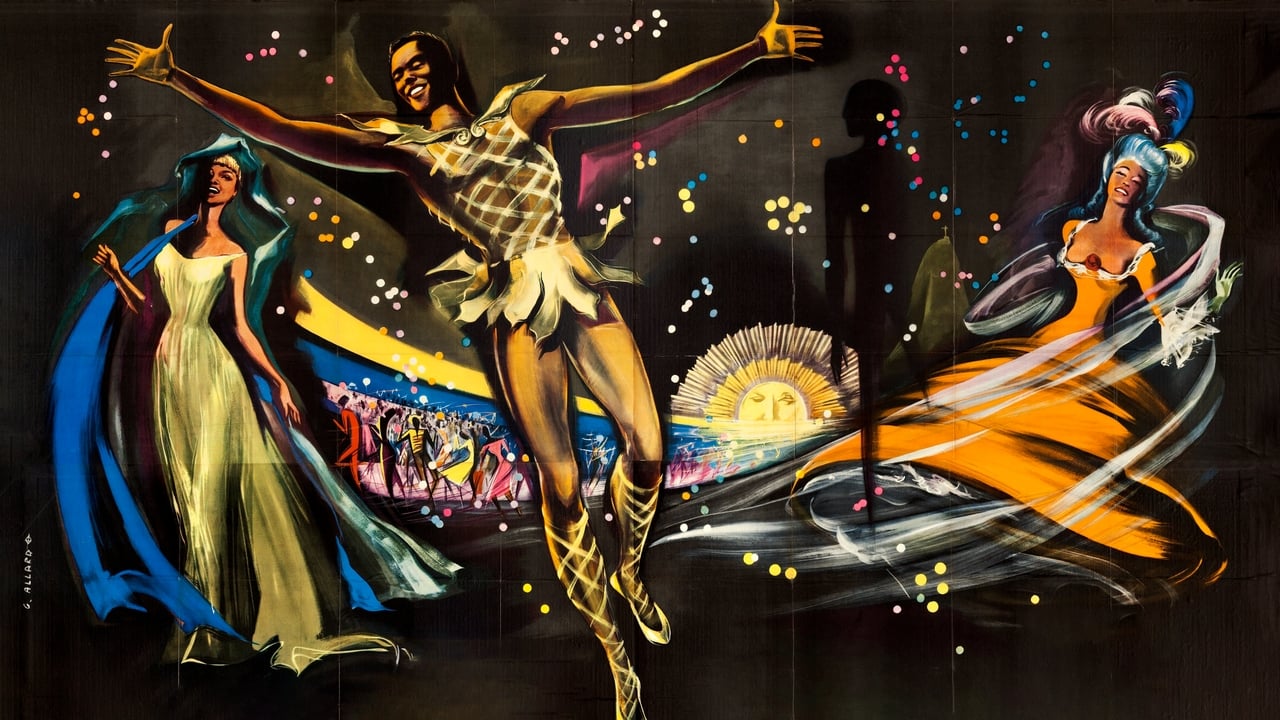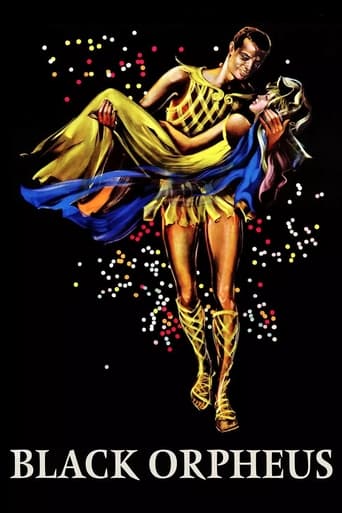

Lack of good storyline.
... View MoreThis is one of the few movies I've ever seen where the whole audience broke into spontaneous, loud applause a third of the way in.
... View MoreThe movie is wonderful and true, an act of love in all its contradictions and complexity
... View MoreStrong acting helps the film overcome an uncertain premise and create characters that hold our attention absolutely.
... View MoreDirector Marcel Camus grabs us from the outset in this film, with the energy of samba music playing as women return to their village carrying large containers on their head. Children are scampering about and they're on a hill overlooking Rio de Janiero, surrounded by stunning mountain peaks and beautiful bays below. The film takes the classical tale of Orpheus and Eurydice and adapts it to Brazil at the time of Carnival, and while I liked the mythological reference, it was the setting, cast, and overall vibrancy that really had me enjoying it. How fantastic it is to see all this color and energy in a film from the 1950's. The cinematography is excellent, with those beautiful vistas and sunsets, and quite a few street scenes as well. There's also some great music, with the spontaneous wailing and drumming in the streets offset by a couple of love ballads with touching lyrics.The central characters of Orfeu and Eurydice are played by Breno Mello and Marpessa Dawn reasonably well, and it was fascinating to me to find out later that Mello had never acted before. Camus saw him on the street and asked him if he wanted to be in a movie, and then he was the star. Orfeu is a ladies man engaged to the vivacious Mira (Lourdes de Oliveira), but he's drawn to the simple purity of Eurydice, who has come to the city for the first time. It's a good-looking cast, and hard not to be drawn by its magnetism. The supporting roles are fine too, starting with Serafina (Léa Garcia) and Chico (Waldemar De Souza), who engage in delightful banter. The two little boys (Jorge Dos Santos and Aurino Cassiano) are also a joy to watch.Sensitivity surrounds the film, since dancing and partying are stereotypes some hold of Brazilians or people of color in general, e.g. reducing them to simple-minded people who do nothing else. I can see the concern and understand a possible negative reaction, and it carries even greater weight when it comes from Brazilian themselves, or the likes of President Obama. I confess I have not had to live with the consequences of these types of stereotypes, so you can take my opinion for whatever it's worth, but I saw it as a celebration of the culture, and it was fantastic to see the diversity. The characters are not single-dimensional, and I enjoyed seeing the love and tenderness alongside sassy playfulness in the romances. As for the lack of realism, well, it's a Greek myth adapted to Carnival, so it's fantasy by definition - and certainly meant to be a complete view of life in Brazil. You have Death chasing Eurydice around, for goodness sake. In adapting the myth, I wish it had been more closely tied to the classical story. It's interesting to me that amidst all of the colorful, wild, chaos of Carnival, which is an extreme representation of Life, we have Death so near, and maybe that's one of the points. The film drags a bit towards the end, though the final scene of the three children dancing nicely lightens the tragedy. Overall, well worth watching, and quite a unique film - just be mindful of the sensitivity.
... View MoreThe IFC celebrated Janus' 50th Anniversary with the release of 50 great movie imports over the years. For those of us that were able to catch, and record, some of those restored films on TV, we were very lucky. This film, which won the 1959 Oscar for Best Foreign Language, was part of that set. The film is set in Rio de Janeiro during Carnival, with bright colors and sounds. It is a modern retelling of the Orpheus and Eurydice myth with a black cast. It is filled with singing, dancing, and the constant samba beat of the Carnival in the background and/or foreground. This film is certainly well worth seeing. However—probably due to my own failings--I was unable to connect with it or appreciate it. So, I won't even try to rank it here.
... View MoreI did remember this title rather well having seen it featured in the book 1001 Movies You See Before You Die, and of course with that recommendation there was no way I was going to miss an opportunity to watch this French/Brazilian film. Basically in Rio De Janeiro, trolley conductor and musician Orfeus (Breno Mello) is engaged to Mira (Lourdes De Oliveira), and new in town is Eurydice (Marpessa Dawn) arrives during the time Carnival week. She is running away from a stalker, Orpheus is instantly attracted to her, and he introduces her to life in this new place, including meeting station guard Hermes (Alexandro Constantino), and given directions she finds her cousin Serafina (Léa Garcia). Orpheus is not enthusiastic about his upcoming wedding, he even buys a new guitar instead of an engagement which Mira wants, this is so that he can eventually celebrate and join in the carnival. He is happy to see Eurydice living next door to him, they do have her stalker Death (Ademar Da Silva) come and find her, but he is chased away, and Serafina's sailor boyfriend Chico (Waldemar De Souza) distracts her attention, so they can connect properly. Orpheus, Mira, Serafina and Eurydice all take part in the carnival with colourful dresses and instruments and join in all the dancing and celebrations, and of course during this Mira finds out about the deception. Death shows up again, and Orpheus tries to chase him away again, and in the process Mira hangs from a power line to get away, and her fiancé accidentally kills her turning the power on. A distraught Orpheus tries to look for Eurydice, but he is told by someone that she may be dead, he goes into essentially the Underworld to search for her. There is a point when he finds what may be her in an older being, and she may in fact be dead, and he mourns, but he finds her body in the dark world and carries it away to take home and bring her back to life. The end is not happy though, as jealous Mira spots Orpheus holding Eurydice on the edge of a cliff, throws a stone that hits his head, and both them fall to their deaths. Also starring Jorge Dos Santos as Benedito. I will be honest that I guess I didn't fully catch on to the Greek story being retold in a more modern form, the cast were all fine, and the love story was interesting enough, but what I personally enjoyed was all the brightly coloured and musical carnival action in between everything, overall however it is a worthwhile romance. It won the Oscar for Best Foreign Language Film, it was nominated the BAFTA for Best Film from any Source, and it won the Golden Globe for Best Foreign Film. Good!
... View MoreRarely have we encountered movies like this one: a timeless mythical story from Greece brought to screen in Brazilian context, the couple come from the very heart of Brazilian society, from Rio. Yet, what links them is the same sweet feeling that have linked the people for thousands of years no matter what nationality, beliefs or family background. Yes, that is what BLACK ORFEUS offers undeniably. The great romance that bursts out in the magnificence and lavishness of Rio's carnival when, truly, body in dance combines with heart in love. Yet, is that the only reason for calling this movie classic? As a matter of fact, there have been lots of love stories on screen that were quickly forgotten. What is, in fact, the very uniqueness of BLACK ORFEUS that differs it from other movies and that makes it an interesting cinema production after all these years? We could say, though ridiculous this may seem, that it is everything about this movie that makes it a timeless work on screen. Yet, such a generalized view may, of course, result in simplification and confusion. There are specifically two factors that make BLACK ORFEUS significant or still worth attention: the first one aforementioned timeless love story uniquely and accurately put in the context of Brazil, which, in itself, must have been a challenge due to its innovative nature but the task was beautifully crafted by the director; the second being the cinematography of the movie which still, after almost 50 years, appears to be astounding. Those two aspects, for many viewers, constitute this "everything." This enthusiasm may be compared to a beautiful painting you admire thanks to its exquisiteness. In the same way, any film which has an interesting story and is visually stunning occurs to be an unforgettable work of art. And indeed, BLACK ORFEUS is a lovely visual work, the colors are stunning and the imagery is brilliant. The gorgeous views of Rio, the beautiful moments of sunrise and the charming views of little houses overwhelm even the most cynical viewers. But what about the rest? Such aspects like performances or action cannot be analyzed in terms of modern cinema, according to what we find in the majority of Hollywood productions. Acting is superb yet their evaluation is exposed to certain opinions that not necessarily occur consistent. These are all Brazilian actors, many of whom are unexperienced when concerning "grand cinema" but this very fact appears to be beneficial for the film since their performances result in authenticity and freshness. You really have a feeling that you watch real people in the very circumstances of the carnival in Rio and their love is genuine. There is a perfect chemistry between Breno Mello as Orfeus and Marpessa Dawn as Eurydice. They beautifully fit to their roles and even their life stories proved that mysterious link. Consider that they both died the same year... Lourdes Oliveira gives rather a funny performance as Mira but is also memorable.IL ORFEU NEGRO is a very valuable film, a sweet and authentic love story that will for long maintain in your memory as body in dance during the carnival and heart in love during romance. I highly recommend it hoping that like the song of Orfeus was capable of bringing sunrise to the world, this movie will bring in many people the rise of quest for beauty and a profound admiration of tenderness. Only then we can find simple things unusual just like the little boy who perceived his kite as the beautiful sun.
... View More